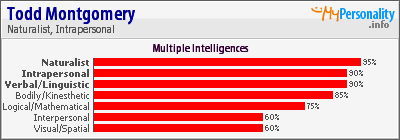 The idea of a single comprehensive test for intelligence (the IQ test) was challenged over 25 years ago by Howard Gardner, whose research suggested that there are many different kinds of intelligence and culminated in his current work on Multiple Intelligences at the Harvard Graduate School of Education.
The idea of a single comprehensive test for intelligence (the IQ test) was challenged over 25 years ago by Howard Gardner, whose research suggested that there are many different kinds of intelligence and culminated in his current work on Multiple Intelligences at the Harvard Graduate School of Education.Gardner describes eight forms of intelligence:
- Verbal/Linguistic - naturally good with writing or speaking and memorization
- Logical/Mathematical - driven by logic and reasoning
- Visual/Spatial - good at remembering images and aware of surroundings
- Bodily/Kinesthetic - love movement, have good motor skills and are aware of their bodies
- Musical - musically gifted and have a "good ear" for rhythm and composition
- Intrapersonal - adept at looking inward, self-awareness
- Interpersonal - good with people and thrive in social interactions
- Naturalist - sensitivity to and appreciation for nature
Know your strengths...and blindspots
 It's a worthwhile exercise to identify your preferred intelligence systems. Doing so can help you understand your strengths, what interests you and give you an idea how to best focus your energy in the areas of your natural gifts and talents.
It's a worthwhile exercise to identify your preferred intelligence systems. Doing so can help you understand your strengths, what interests you and give you an idea how to best focus your energy in the areas of your natural gifts and talents.It's also helpful to become aware of which areas are of lesser interest to you and may represent your potential blindspots. This provides insight into your own areas for personal development - though on balance you may also choose to "outsource", seeking advice from people who rate highly in those intelligence systems so you can benefit from their complementary perspectives.
An additional reason to learn about how people's intelligence preferences differ is that you can then better understand some of the reasons why another person's view of the world differs from your own - sometimes quite dramatically!
Accepting the valid grounds for having preferences and perspectives that differ (i.e. they may be based on different Multiple Intelligence preferences) helps people get beyond pointless debates about "right/wrong" or "good/bad" to reach a place of "different, each with its own merits". In this mode you will then be much better equipped to value and respect each perspective and engage in a collaborative and productive discussion.
Multiple Intelligences - insights
To give an example of what I mean, here are my results from an online version* of the Multiple Intelligences self-assessment:
Major learning - my strongest intelligence is "Naturalist", which is related to nature, animals and the environment. This result surprised me in the way that happens when you suddenly notice something that's been right in front of you all along. To wit: if I just take a look at this blog's list of "adopted mascots" and its strong environmental theme then it's right there, plain as day. I like this realization because lately I've consciously noticed my enjoyment of nature and actively sought opportunities to do what I like to do and am "good" at noticing.
Biggest surprise: "Interpersonal intelligence" comes sixth(!) on the list. Now, while there is no "fail" in this test, I was surprised and disquieted by this because I've made a career of consulting in human behaviour and interpersonal dynamics, so I thought that I "should" have ranked higher here. Then I thought about it further and came to the humbling realization: I simply don't have all the answers in this field - I have as much to learn about this subject as the people who seek my expertise. This, in turn, I found quite liberating since the corollary is I don't "have to" have all the answers...and I think that ultimately makes me a better consultant, one who's able to work with what's there and collaborate with clients rather than being the pontificating "expert".
Making it real: theory into reality
By now I guess you get the idea - the multiple intelligence model is a useful tool for identifying and working with people's existing abilities, to help them get the most out of what comes naturally to them and spot potential blindspots for development work or seeking the complementary skills of others.
Of course, this should not be just an intellectual exercise. It's not enough merely to know there are differences - individuals and teams will want to know how to capitalize on this knowledge for competitive advantage!
tmconsultancy helps people find ways to manage the inevitable conflict that differing perspectives can create. People learn to talk TO each other, not past each other. This kind of useful dialogue helps channel the energy of conflict into productive activity, avoiding the miscommunication dramas and fragmented effort that hobbles teams and undermines engagement. When people learn to play to their particular strengths and teams learn to weave a powerful tapestry from the complementary talents within them, interpersonal communication improves dramatically. The outcome: better results, performance and personal satisfaction.
To find out more about how tmc can help you to turn useful theory into powerful practice, email me!
TM
*-I've no affiliation with this site; registration required, test is free
.

No comments:
Post a Comment